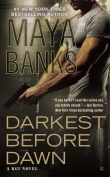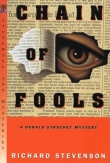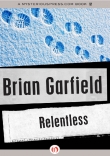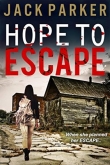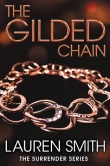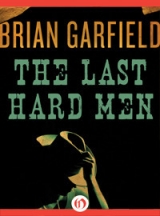
Текст книги "The Last Hard Men"
Автор книги: Brian Garfield
сообщить о нарушении
Текущая страница: 1 (всего у книги 12 страниц)
The Last Hard Men
Brian Garfield


One

When Provo tripped, on purpose, over his leg irons, he let loose of the sledgehammer and fell on his hands. He timed the fall to put the fist-sized rock under his chest. When he started getting up, the rock was enclosed in the circle of his fist.
Guard Harrison came wheeling back down the hill road along the line of shackled prisoners, hefting his riot gun like a club. His big face was angry-red, peeling under the Yuma sun. “Shake it up, Provo.”
“Don’t shit in your britches.”
Harrison’s pale eyes studied him with hot mistrust. He turned to reach down and pick up Provo’s discarded sledgehammer, and glanced up the hot dusty hill. The front of the line had gone across the top—Guard Johnson was up front somewhere.
Guard Harrison seemed to catch it coming, out of the corner of his eye, but he was too slow. Provo smashed the rock into the back of his head.
It stunned the guard. He went to his knees, eyes losing focus. Provo jumped at him, rolled him over on his back away from the riot gun. Harrison was too dazed to fight, but his eyes showed his distress; sweat burst out in beads on his upper lip.
George Weed said, “Kick the shit out of him, Zach.”
Provo ignored it. He reached across Harrison to get the riot gun.
Guard Johnson came in sight on the hilltop, looking to see what had stopped the marching line. Provo leveled the riot gun. “I’d stay friendly.”
But Johnson’s gun muzzle lifted. Provo pulled the trigger: the buckshot blast ripped into Johnson’s chest and exploded his heart. Spasm closed his hand around the trigger and his gun erupted into the ground; its recoil knocked it out of his fists.
Provo could tell Johnson was dead by the way he fell. He spun toward Harrison, worked the pump action of the riot gun, and braced himself. But Cesar Menendez was already on top of Harrison, dragging the next man after him on leg chains; Menendez had his thumbs against Harrison’s eyes and his knee in Harrison’s gut. Harrison tried to struggle—got his hands on Menendez’s wrists. The little Mexican batted them away with contemptuous indifference and went for the throat, thumbs against larynx. It only took a few seconds.
Provo’s fiery eyes shifted from face to face. “They made a mistake, marching us this far out of Yuma to build their fucking road. Nobody near enough to remark those gunshots. We’re out.”
Young Mike Shelby was dubious. “We ain’t likely to get far in these irons, Zach. The keys are back in the yard captain’s office.”
Provo bounced the riot gun in his enclosed fist. He reached down with his free hand to pick up the sledge-hammer. “We’ve got these. Bust the chains, anyway—worry about the ankle cuffs later. Unless some of you want to walk back inside the walls?”
Provo smiled, and moved suddenly: he did most things suddenly. He lifted the hammer overhead in both hands and brought it down hard on the chain between his foot and Menendez’s. It crumpled a link but didn’t break it. A knotted muscle bunched at Provo’s dark jaw line; he swung again, swung a third time, and parted the chain.
There wasn’t much talk. Hammers started swinging all up the line, driven by biceps hardened on the Yuma rock pile.
Provo picked up the riot gun, sat down in the dirt, and splayed his legs out straight. The two-foot chain hung slack between his ankles. “Bust me loose, Menendez—and you ricochet any pieces into my balls, I’ll kick your ass into the middle of next week.”
Young Mike Shelby said, “He’s joshin’ you, Cesar. He’s too old to have much use for them anymore. Anyhow he’s been in Yuma so long he’s forgot how.”
“Twenty-eight years,” Provo breathed: the Yuma gates had closed on him in 1885.
Menendez’s hammer clanged off the chains; finally they broke. Provo stood up dragging the ragged ends. Menendez said, “Cot it off with a hacksaw, if you can get near one. Only take about fie honnerd strokes,”
“If he don’t cut his ankles off instead,” Mike Shelby said. “That’d be a lot quicker.” Shelby was always ready with a sour humorous remark. He only had six months behind him; they hadn’t crushed it out of him yet.
Provo’s dark hatchet face swiveled toward Menendez. “Come on up the hill with me. Let’s take that other gun away from Will Gant before he decides to walk off with it by himself.”
“Orrai,” Menendez agreed.
They walked up the hill past swinging hammers. Provo had his finger inside the trigger guard of the riot gun, the slide balanced across the crook of his elbow. Portugee Shiraz, vulpine faced, grinned through bad teeth and said, “What you gonna do next, Zach? Part the waters?”
“You just stick with me, Portugee.” Provo went on up the line with Menendez.
Will Gant saw them coming. He swung his big-bellied shape around ponderously and thought about picking up Johnson’s riot gun from the ground—he had put it down to use both hands on his sledge.
“Naw,” Menendez said, “I wouldn’t think like that, Will, it ain’t es-smart.”
Gant kept thinking about it, though—measuring the distance, judging the angle of Provo’s gun muzzle. The heavy roll of his lips peeled back nervously. “Yair,” he said, “I guess not. You want the gun, hey, Zach?”
“I’ve already got a gun,” Provo said. “Menendez wants the gun.”
Gant thought about that, visibly. Finally he said, “You waitin’ on me to fight you for it, Menendez?”
“Naw, you lazy turd. I ain’t got time for such truck.”
“Then get yo’ dumb ass on over here and pick it up. I ain’t rightly fixin’ to mess with you.”
“Smart,” Zach Provo commented. “Go ahead, then, Menendez.”
Menendez, with a thin smile, bent down to pick up the gun. He kept his head cocked, kept his eyes on Will Gant looming above him. Gant didn’t stir. Menendez hefted the riot gun and went over to the dead guard to strip the blood-darkened cartridge belt off him.
Provo was counting heads from his vantage point on top of the hill. Will Gant waddled over and ranged himself alongside him. “You takin’ over now, Zach?”
Twenty-seven men, Provo tallied. Too many: too unwieldy. Distracted, he said, “What do you think?” And without awaiting a reply, climbed the steep pitch alongside the road to the summit twenty feet higher. From here he could make out a little bit of the brown glint of the Colorado River, and the bluff where the ruins of Fort Yuma stood on the far side, in California. The flayed hilly landscape was empty of movement. The sun, on this early morning in July, was hard as brass. He had it behind him. He turned a slow circle on his heels surveying the great desert baking pan eastward, the line of stunt trees along the Gila and distant arid mountains. He shaded his eyes with a hand, saw nothing—no stirrings, no dust—and skittered back down to the road.
The hammers were still ringing. He waited for them to finish. Menendez fixed himself to him, at his shoulder. “What now?”
“We get rid of the sheep,” Provo said. His eyes were narrowed in a thoughtful squint.
“And keep the goats?”
“Aeah.”
Menendez picked at his scalp and studied his fingernail. “Then you got a plan in mind.”
“Maybe I do,” Provo said. He filled his chest and bellowed: “All right, everybody up here!”
While they gathered slowly around him, Provo’s eyes dreamily tracked a scorpion under the shade of the rock shelf on the slope beyond the road. Its tail stinger was curled up over its back. Portugee Shiraz and Lee Roy Tucker sat down in the road, hammers across their laps. The rest crowded around, stinking of sweat, staying on their feet, and there was a lot of excited talking until Provo yelled at them to quiet down.
“We’ve got to split this bunch up,” he said when he had their attention. “We’ve got maybe three hours to get shet of this place before the noon water wagon comes. I want them to find tracks going every which direction. Alcorn and Pete Cruz, you take Torres and those two over there and walk north along the river till you get to Quartzsite.”
Tom Alcorn said, “Jesus, that’s eighty-five mile, Zach, we can’t just–”
“You can—or maybe you’d rather end up back in the hole? You can walk it in two days, drink out of the river, keep out of sight if you hear anything, duck into the river if you hear dogs. You find yourselves a blacksmith shop in Quartzsite after dark sometime and get rid of those irons and then you’re on your own.”
Lee Roy Tucker picked up the hammer in his lap. His adenoidal mouth was open; he was thin as a sapling, with pinched eyes and buck teeth. “Who elected you to give awders, Zach?”
Provo’s riot gun stirred. “I won’t waste time arguing. Alcorn, get your bunch moving. Now.”
“Shee-yit,” said Lee Roy Tucker, but he stayed put and watched Tom Alcorn and the other four walk away over the hill without remark. They were happy to go: Pete Cruz was talking about his woman in Guaymas when they walked out of earshot beyond the hilltop.
Provo singled out four more and sent them west, told them to wade across the Colorado and lose themselves in the California badlands. They didn’t like the idea much but Provo had the gun, and they went. None of them promised to stick to the route he had dictated, but it didn’t matter to Provo; all he wanted was to get rid of them.
He sent seven more, most of them Mexicans, due south—told them to hold to that course until they got well south of Yuma, across the Border into Mexico. They could walk east along the canals to Calexico. They grumbled, and went. Probably they’d get rounded up within twelve hours.
He sent the three old-timers down the Gila, eastward. The river was dry, only a few sinkholes, but they went, because Provo had the gun and Provo was a tough breed to tangle with; and because Cesar Menendez just stood there with his riot gun, watching them all with his fast little eyes.
Provo counted heads again. “Nine of us. That’ll do.”
“Do what?” young Mike Shelby asked. “What you got in mind, anyway?” Shelby was the only one of them with balls enough to ask that kind of question against Provo’s gun, but Shelby was the only one who knew how to take the sting off a challenge with an amiable smile. He had a wide friendly face and a head full of chestnut hair, and the innocence of his nineteen years.
Provo looked them over, walking around, going from face to face. “This time tomorrow,” he said finally, “those others will all be back in Yuma if they’re not dead. Same thing can happen to us if we don’t work together. Everybody understand me?”
Lee Roy Tucker said, “Maybe some of us might rather not take awders from you, Zach.”
Provo shifted the riot gun to his left hand. His right hand gripped Lee Roy’s arm. Lee Roy burst out in a gray sweat. The steel fingers bit into his arm, the strong thumb casually working flesh against cartilage against bone. Provo said, “When I say jump, Lee Roy, you say How high?”
He let go of Lee Roy’s arm and stepped back. Lee Roy looked unhappy, as if his shorts were bunching up. “I don’t think I want to mess with you, Zach.”
“You bet your ass you don’t.”
Anticipating trouble from Will Gant, Provo wheeled that way. Gant was tugging at a thick black hair in his nostril. The blunt head was anchored on a thick neck that bulged with folds of fat; the eyes were crafty. Provo didn’t bother to watch the eyes, with which Gant would be likely to feint; he watched Gant’s feet instead. “How about it, Will?”
“Depends what you got in mind.”
It was easy enough to read in Gant’s sullen face: he’d sooner herd sheep than follow orders from a half-breed Navajo. But Provo had the gun. Provo said, “I’m going to get us out.”
“All right. You won’t have no trouble with me.” Gant relaxed; his feet shifted and splayed.
Provo turned away, satisfied. “Everybody pay attention now. We’re going to walk straight over to the Colorado and sink ourselves down in the arrowweed over there until dark. Sweat it out. On the far side of the river, so the dogs won’t get to us. Come dark, we wade downriver into Yuma.”
“Into Yuma?” Lee Roy Tucker yelled.
“Shut up and stay still. We wade into Yuma and we wait under the ferryboat dock until sometime after midnight. There’s an eastbound S.P. freight comes in across the bridge about two in the morning. Pulls out for Tucson around three. There’s always half a dozen zinc-lined meat-hanging icebox cars. We climb into one of them. They’ll search all the cars on the train but we hide back in the corners behind the carcasses, underneath. They won’t take much time to search—they can’t hold an ice car open for long, everything’d melt. Middle of the night, they’ll be tired out by then anyway. They won’t find us as long as everybody keeps quiet. We’re going to freeze our asses but we’ll make it. Soon as the train pulls out of Yuma we pitch the ice out and get ourselves thawed out. We jump off when she slows down at some town up the line and we lay belly-flat in the scrub until she’s gone by. Then we shanks-mare into town and saw off these irons after dark, and get horses under us.”
Mike Shelby said, “You’ve got it all worked out.”
“I’ve had twenty-eight years for it.” He looked them over with icy contempt. “Everybody hear me the first time?”
Lee Roy’s jaw was set. “You got short brains, Zach. They bound to get aholt of us.”
“Like hell they are. Don’t be a farmer.”
Lee Roy was rubbing his arm where Provo had squeezed it. Provo said, “You can do this with your teeth or without them. Which way you want, Lee Roy?”
Lee Roy licked his upper lip. “I don’t know. Maybe I’d just as soon go it alone, you don’t mind.”
“I mind,” Provo said, flat. “Nobody busts loose now, Lee Roy. Not after you’ve heard the plan. We go in together and we stick together—like flies on flypaper.”
“Why? One less man, make it that much easier for you, Zach.”
“I can’t have you wandering into a posse and yapping to the law what we’re doing. Understand? Now you go ahead and walk away from here if you’re still a mind to, Lee Roy. But it’ll take you all the rest of your life to walk two steps. Hear?”
Lee Roy scuffed his feet and scowled and didn’t argue.
With a tongue dipped in vitriol, Provo snapped at them all: “I was born a few minutes ahead of the rest of you fools—just remember that. Come on, Menendez.” He turned on his heel and walked west, toward the river. The loose ends of the chains whacked him around the ankles but he didn’t slow down.
When he looked back the rest of them were following. Menendez, with the riot gun, was herding them.
It was stinking hot in the arrowweed rushes. The late afternoon sun beat down on the muddy surface of the river. They could still hear the dogs baying, going away upriver on the far bank, probably tracking the Alcorn bunch on the trail to Quartzsite. He had planned it like that.
Menendez said, “Sonoma bitch, it’s gonna work.”
“We’re not out yet.”
“Bot it’s gonna work. Seguro que sí.” The cruel fox-thin face smiled. “What’s that song you humming?”
“Owl Song.”
“Hey?”
“They sing it on the Reservation in hard times,” Provo said. “Owl’s a tough bird.”
“You ain’t a fullblood Navajo, are you?”
“Half,” Provo said.
“Me, I’m half Messican and half es-Spanish and half Yaqui and half Texano and half focking rattlesnake, I guess. Listen, Zach, what we gon do after we get horses?”
“I don’t know about the rest of you. I know what I’m going to do.”
“Ahjess?”
“I want Sam Burgade,” Provo said. He slapped a mosquito. “I want Sam Burgade’s cocksucking hide on a spit.”
“Hell, ain’t you got nawthing better’n that to aim for, Zach?”
Deep hate was a fervor that got stronger with time. Provo shook his head. “I want him, Menendez. I want to peel the tough old bastard down to a whimper.”
“Hell, he’s got to be a real old man by now.”
Provo didn’t say anything. After a while Menendez said, “Sam Burgade ain’t nawthing but a tired old man, Zach. You’ll suit yourself, I guess, but it ain’t es-smart, what you fixin’ to do. You want to get your hands on Burgade, you gonna have to show your efface right in the middle of Tucson. Tucson’s a big town. They got a lot of law there.”
Provo grunted.
Menendez said, “And it ain’t as if he was some old mestizo nobody cared nawthing about. Burgade, he’s an important es-sonomabitch. Maybe he don’t tote a badge no more but he’s got a lot of important frands. They hang you sure.”
“If he’s riding high that’s fine,” Provo said. “The ground will hit him a lot harder when he falls.”
“Shit, whatever he done must’ve been a focking long time ago, Zach.”
“Shut up,” Provo said.
They kept close to the bank, slipping and sucking in the mud, wading into Yuma under the wharves of the old riverboat shipyards. The crosshatched spindle tracery of the S.P. railroad bridge was a latticed silhouette against the night sky. Lamplight reflected off the dappled surface of the Colorado. The water was warm, a fast current that kept them moving downstream. Provo had the riot gun over his shoulder to keep it dry.
The ferryboat was over on the California side. They gathered under the landing slip on the Arizona side and waited. Provo’s flesh had already begun to pucker from waterlogging; he climbed up into the woodwork under the ferry dock to dry off. The others took perches in the framework around him, like pigeons resting,
A federal motorboat putted by, coming downstream fast on the current, its electric search light sweeping the river. It didn’t have a chance of picking them up where they hid. It went by and there was only the faint lapping of the river against pilings, the clatter of wagons and the occasional cough and sputter of a passing motorcar. Sometime around eleven, the westbound passenger flyer roared across the bridge toward San Diego. They had another three hours to wait.
Someone urinated into the river nearby—the trickle was plainly audible. The ferry came across on its guy ropes, gasoline engine chattering, carrying two horseless carriages and a horse-drawn victoria and a dozen pedestrian passengers. Provo took a strong grip on the piling and held on while the ferry rammed into the slip and made everything shake. It didn’t knock anybody off. The ferry got rid of its load and a new California-bound load came aboard. Provo couldn’t see it; he could hear it. Someone’s boots tramped the dock heavily and he heard a hard voice talking to the boatman: “Keep an eye on the river tonight, Charley—God knows maybe they’ll try to come down on rafts or something.”
“How many of them convicts you boys got back?”
“Picked up three on the Gila and a half dozen Mexes down south of town. The Chief just telephoned in from Quartzsite, they got five or six pinned down in a ranch house halfway up there, holdin’ out with the rancher’s guns. We’ll get ’em soon as they run out of cartridges. Last I heard the dogs picked up another bunch that went west across the river. Prob’ly round them up by sunup. Just a matter of time, Charley, just a matter of time. We’ll get ’em all, just as sure as they’s a hole in your ass.”
The boots tramped back to hard ground and the ferry chugged away. Menendez said in Provo’s ear, “I hope that es-sonomabitch is wrong, hey? They ain’t gon get us now, are they, Zach?”
“Not me they ain’t,” Provo murmured. “Not until I make Sam Burgade sweat some blood, they ain’t.”
It worked fine. A railroader opened the side door and flashed an electric torch around quickly and slammed the zinc door shut. Didn’t glimpse them. They all sat in the thick dark and trembled with cold until the train started up with banging couplings and slowly picked up steam. Provo waited until he couldn’t stand the cold any longer, and then he hummed the Owl Song to himself and waited another fifteen or twenty minutes, and when Menendez joined the chorus of groans in the dark Provo smiled, because no one could see his face, and said under his breath, “Not half bad for a fifty-two-year-old half-breed,” and got up and shoved the sliding door open and said, “You bastards start heaving that ice out of here before we all turn blue.”
The train started to slow down for Gila Bend about six in the morning. When it was half a mile out, Provo slid the right-hand door open and nodded to Menendez. Menendez jumped—landed running like a cat. Provo poked the rest of them out, fast, with his riot gun and went out last, after pulling the door as nearly shut as he could and still squeeze through. Maybe they wouldn’t find the warm icebox car until Tucson or maybe even El Paso.
He hit easy on both feet, legs bent against the fall, went over on his shoulder and rolled. He didn’t lose his grip on the riot gun. His shoulder was a little banged up and he’d bruised one heel, but that was all right. He bellied down in the brush and watched the long train clatter past. The caboose went by and he waited until it was into town beyond the outskirt laborers’ shacks; then he spoke softly and gathered them around him and said, “We make for the nearest shack up yonder. We get inside it and we wait for dark. Move.”
He let Menendez lead the way. He waited until they had all crawled past before he fell in at the back of the line. Broken chains rattled on their ankles. Provo hung back a little: better not to let any of them see he was favoring his right foot from, the jump. They kept to a line of approach that interposed the cluster of shacks between them and the town. Nobody was likely to see them, but Menendez moved bent double and the rest followed suit, dodging from greasewood bush to paloverde. Clump to clump.
Menendez stood up against the corner of the weather-blasted gray shack, eeled around the corner and disappeared. Provo tensed, squinting into the morning sun. But after a minute the back shutter flapped open and Menendez waved them in.
Provo came in last and pulled the warped door shut behind him. The nine men made a dense crowd in the little shack; it was barely big enough to accommodate two occupants. He could smell the sweat already, and the day hadn’t started to warm up yet. Under the tarpaper roof it would get up to a hundred and twenty in here by mid-afternoon.
Young Mike Shelby said, “Maybe we ought to split up some. Take a couple more cabins, three men in each one.”
“We stick together,” Provo said.
“Why?”
“I want you all where I can see you.”
Lee Roy Tucker said, ‘“for how long?”
“Until we get rid of these irons and get ourselves into clothes everybody won’t recognize.”
“Sounds reasonable,” Mike Shelby said, and sat down on one of the two cots. There was a rickety table with a lamp and washbasin. Shelves nailed on one wall—a few boxes and cans of food. George Weed, blackskinned and full of disgust, slid his back down the wall in the front corner until he was sitting with his shoulders wedged in. “I don’t suppose anybody’s got a deck of cawds.”
Provo studied them covertly, one at a time, measuring them. He took his time.
Menendez: little, fox-quick, cruel, practical. Mike Shelby: young, level-headed, good-humored, a friendly face and a shaggy head of chestnut hair and big tough hands. Lee Roy Tucker: slat-narrow, buck-toothed, a complainer, but Lee Roy had handled blasting caps, working in a quarry, and knew explosives. Portugee Shiraz: part Portuguese, part Negro, eighteen years into a thirty-year noncommutable sentence for having knifed his wife and two children, one of whom had died; Portugee had the snout of a mountain wolf and he loved knives, all kinds of knives; he had worked in a slaughterhouse. Will Gant: a very big brute with a belly on him, not quite as slow in the head as he seemed. George Weed: black, square-built, his hair like a wire-wool skullcap, lazy eyes; contained and quiet except for occasional bursts of anger. Taco Riva: ex-mountain bandit, ex-vaquero; Taco loved horses, in all possible ways. Joaquim Quesada: a big-nosed brute with thick shoulders and a deep chest, a gray monk’s fringe around his bald head, his face purple with tiny broken blood vessels—an alcoholic, an incorrigible petty criminal, and in spite of his bulk, an expert sneak-burglar.
And the ninth man. Zach Provo. He didn’t need to size up himself.
His attention went back to Cesar Menendez. Menendez had quick spidery hands and a cynical mouth. His face and hands were slightly fire-scarred: he had burned down the Santa Cruz County jail around him in a fit rage, and been sentenced to six years for arson. In a way Menendez was the key. No one man could handle a squad this big by himself; a man had to sleep sometime. There had to be a second-in-command who could be depended on. Shelby might be dependable, as far as it went, but Shelby was too young and too easy-going to command their respect. The rest of them, prison dregs, were born followers. Or maybe loners. But not leaders. Menendez was the only leader, himself aside. He didn’t know, or care, whether Menendez liked him; but he had the feeling Menendez respected him—not out of fear, but out of admiration for his brains.
Provo licked his upper lip, like a cat washing itself. It was worth a try, anyway. Menendez was over at the door, watching Gila Bend town through cracks in the splintered boards. The sun was hitting that face of the shack and the others had crowded away toward the cool side of the room, squatting around in little knots of dulled talk. Provo moved casually to the door and spoke in a voice calculated to reach no farther than Menendez’s ears:
“You willing to stick by me a while longer?”
“You asking or telling?”
“Asking.”
Menendez glanced at him out of the edge of his eye. “What you got in mind?”
“You’ll see. Just back me.”
“I don’t know, Zach. If it’s about Sam Burgade—”
“What if it is?”
“I got nawthing against Sam Burgade. That’s your fight, not mine.”
“What if it gets you a free ticket out from under the law?”
“How?”
“Just stick by me.”
Menendez thought it over. “Orrai. For a while, anyhow. I’ll es-stick aroun’ until I see how it blows.”
“Sure. You never know, you might even get your hands on that cache of railroad money I buried twenty-eight years ago.”
“Hell, you prob’ly don’ even remember where you put it, that long ago. I never believed moch in that rumor.”
“It came to pret’ near forty-eight thousand dollars. In gold eagles. Two hundred pounds of gold. They got me but they never got the money back.”
“You making me an offer, Zach?”
“Maybe.”
“You better es-spell it out a little clearer, then.”
“This ain’t the time. But you just keep it in mind.”
“Ahjess. I’ll do that.”
Provo moved away in the center of the shack. “All right,” he said, and got their attention. “Tonight Menendez goes into town for a hacksaw and some food and clothes. Well get fixed up to look like civilians. After that you-all are figuring to steal horses, split up and run for it. That’s all right for them as want it. I don’t particularly recommend it. What chance you going to have, without a cent in your kick? You’ll just get rounded up one at a time. Nothing to show for it but shriveled guts and saddlesores and a few days running like hell through the brush.”
Mike Shelby said, “You’re talkin’ like you got something better to offer.”
“I have. But maybe you people would rather let them surround you with telephone messages and posses out of every county seat from here to Oklahoma. Maybe you’ve had enough of my ideas.”
Shelby said what Provo knew he’d say. “You done all right up to now, Zach. Let’s hear what you got in mind.”
Provo glanced casually at Menendez, met a glance of bland unconcern, and squatted on his haunches. “We’re going to get ourselves a healthy stake and take care of some personal business and then we’re going to head for a hideout where the law can’t touch us. All of us. We stick together all the way through, just like we’ve stuck together up to now. How about it?”
They exchanged glances among themselves. Lee Roy scowled at him but didn’t say anything. Finally Mike Shelby said, “Go ahead, Zach.”
“In a minute. What I’ve got in mind, it’s going to take timing and planning. It’ll take all of us to bring it off. But it’s just like getting out of Yuma—I can’t have any of you people hearing me out and then deciding you don’t want to do it. Nobody cuts out on me. Anybody wants to leave, say so right now, and we’ll wait till after dark when he’s gone to talk about the rest of it. How about it? Anybody want to call it quits?”
He looked around, without expression. Implying if anybody wanted to quit, there’d be no hard feelings. It was a lie: if anybody tried to back out, Provo would kill him. But there wasn’t much point in saying so.
“Lee Roy?”
“I don’t rightly know. I don’t hanker to ride out alone and git my ass blowed off. I don’t rightly know this country arand here. How long this binness take?”
“Three, four days, A week maybe.”
“We split up after that?”
“After that,” Provo said, “I don’t give a shit what you do Lee Roy. But whatever it is, at least you’ll have a stake to do it on.”
“How bit of a stake?”
“A few thousand, at the least.”
Will Gant said, “Seems to me that’s worth thanking about.”
Lee Roy said, “I expect I’ll go along, Zach.” His tone said he didn’t like it much but he liked the alternatives even less. That was all right; Provo didn’t care about his motives. But Lee Roy could handle explosives and Provo needed him especially.
Portugee Shiraz said, “I’d surely admire to get my belly around some food.”

